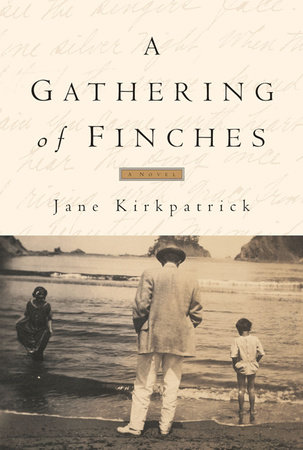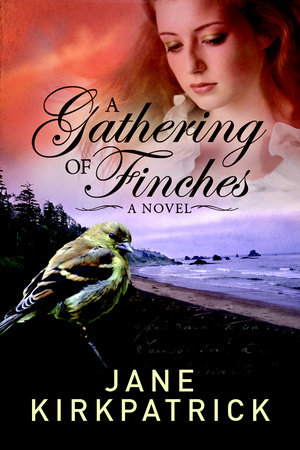Excerpt
A Gathering of Finches
PrologueI remember that first
wit-litz with my Coos Indian maid in the autumn of 1899. Sea gulls screeched against the threatened squall as the wind pushed at our wedge-split canoe breaking choppy water on Oregon’s South Slough. As morning sank into afternoon, pileated woodpeckers cackled and flirted with Douglas firs marching like silent warriors down steep banks to sand. I remember that crossing-over, that
wit-litz. Loaded with people and baskets of berries and bread, the shallow crafts took us from shore to shore and just one mule ride short of the Pacific. The scent of oil burned to smooth and widen the cedar crafts lingered on my fingers and my linen skirt.
We could have crossed on the rickety bridge north of Valino Island. It still stood then. But such a journey lacked the proper adventure. Adventure ought never be thwarted. Adventure and novelty, change and variety, that’s what kept boredom at bay, and any price paid proved worth it, even when it bordered on the foolish, even when it circled the insane.
I never imagined Lottie and I would share a friendship, a finished woman and her employee. But we did, though I sensed even then how those brown Miluk eyes judged my lavender love. She might have called it self-indulgent if she’d known the word and I had bothered to ask. I called it a grand love, passionate and providing, despite its being fringed with suffering and anguish … perhaps
because it was.
So much had happened: the lies, the choices whose consequences now skipped before me like flat stones on ponds. I saw no need to face them, barely gave them a fleeting glance. I sought an invitation to avoid them instead, to celebrate my independence, my intention formed separately from the family and faith I’d been born to.
The
wit-litz and my friends gave me that chance.
“Harder, Lottie!” I shouted over my shoulder. I heard her wheeze as she dug her paddle deeper, maneuvering us around nasty snags. We led the competition by only a canoe length. The double-pointed cedar dugout swooshed against the tidewaters splashing salt spray onto my face and wilting the plume of my hat that drooped now over my eyes. I pushed my lower lip out and blew air to watch the feather flutter. Covered baskets seeping the aroma of fresh bread sat like clusters of lily pads beyond my knees toward the prow.
“A going-over place,” Lottie shouted from behind me, her voice crisp above sea gulls’ screeching. “Mmm. My people call it
wit-litz. Wit-litz.”
“What’s that?” I turned enough to see her and the other canoes piercing the distance between us like well-shot arrows.
“Crossing over,” she said.
“We’re surely doing that!” I said, turning back. The little sound that preceded some of her words reminded me of a hummingbird quietly announcing its arrival.
She said something more, but the slap of water and wind drowned her out. I twisted again to hear her, and when I did, a gust pulled at the plume and ripped it and the hat from the roll of hair piled atop my head. I gasped as I grabbed for the hat and missed. The violet felt and feather took flight like a frightened bird, twisted and rose, then plunged and sank. I swallowed hard as the current sucked it under, leaving behind empty space. Something seemed familiar in the motion.
It wasn’t that I needed that hat. I had a dozen others and could buy a dozen more. It wasn’t much of a fashion accessory at all. But the pearl hatpin I thought would hold it to my head carried meaning for me and was something that, though not needed, had been wanted.
“Oh, misery,” I said.
Lottie back-paddled with the oar now, her muscles brown and bulging as she turned us toward the hat’s resting place.
“No!” I said. “Keep going! They’ll beat us!”
We were the lead canoe by only half a length now. Five more filled with family, some friends, and one dog broke the water behind us. We could have launched a rowboat and crossed by ourselves or hired one large scow to do the work or even used the hand-drawn ferry at Charleston Beach. But Louie had wanted this first trip with me to be in cedar log dugouts with Indian paddlers. Something “a bit above the ordinary,” he’d said, “the way they used to do it.”
“Don’t worry your lip,” Louie said then as his canoe pulled alongside ours. I jerked my hand to my lap. Ellen, his rower, rested the paddle across her knees, and Louie grinned at me. “Sun makes your hair look like sable,” he said. “Stunning.”
“We could drop a line for it,” Ellen offered. One hand shaded her eyes against the afternoon sun as she peered at the dark water. She lowered her hand to control her canoe against a push of wind.
“It’s nothing. Silly to wear one anyway out here. I won’t again. The pin was special, though. Mother gave it to me when Belle was born.”
“We’ll get another, Case,” Louie said, “soon as we get back. Your mother will never know we replaced her pearl returned this day to the deep."
He had an orator’s voice, full of vision and passion and promise of adventure. The sounds of it washed over me, the deep tones as mesmerizing as the pounding of the waves or the soft hiss of the wind through cedars. Or perhaps it was the depth and size of his dark eyes that I sank into, had changed my whole life for.
His wide hands pulled our canoes together. The crafts thunked, unsettled me with the quick movement. The poodle barked from inside her basket nestled between Louie’s feet. I grabbed at the canoe’s sides to balance. Louie took the moment to kiss me, in front of everyone, his warm lips lingering for just a moment on mine before the wind shifted our crafts. His hands on my cheeks smelled of salt air and charred cedar.
In the distance, I heard a few shouts from his brothers and others as they passed us, but at that moment my heart and ears and eyes belonged only to him, Louis Simpson.
“I love you, Cassie-Casey,” he said.
“I love you, Louis-Louie.”
He bent his head to my forehead and sighed contentedly. Then quick-changing as a summer squall, he released me, sat alert, faced west, and shouted, “Onward, Ellen!”
She pushed off with a quick thrust, and his hand shot into the air as though holding a sword and leading a military charge. “We’ve a pack string waiting and a picnic lunch promised.” Then over his shoulder to me he issued a challenge he knew I’d not resist. “Beat you to the shore, Babe.”
Ellen paddled toward the tangle of dense timber and vines and the sand dunes and ocean beyond. Her arms dug deep, and despite her passenger being the largest of all, she gained on the others. They exchanged shouts and laughter.
Lottie and I were last.
My eyes followed Louie’s dark hair and the back of his ivory suit. He sat well above his paddler and waved his hand in a circular motion as he passed the others, urging all to the shore. “Harder, Lottie!” I ordered. She was a bulldog of a woman, short and squatty and square and a powerful rower, but I knew victory would elude us.
Louie passed them all and reached the shore. He busied himself bending low to step out, then stood, pounding his chest in victory. The others beached their crafts, laughing, talking to Jake Evans, the mule-string handler waiting for our group.
A blue wedge chased the squall from the sky and exposed the sun, bright overhead. I grabbed at my skirts and stuffed the bulk between my knees and set my boots firmly on the bottom.
“That is danger!” Lottie shouted. “Think about it!”
A wind gust seized my hair then tangled and twisted it like mist over eyes. Water and sky and audience on the beach disappeared for the moment.
“Sit down!” Lottie shouted, loud enough to cause those beached to turn their eyes toward us.
Through the strands of my hair I saw how they stared. Concern clouded their faces and then admiration as they watched our craft approach through the white chop. It was the latter look I liked.
I took a deep breath and let loose my hands.
“You will make both of us sink!” Lottie warned.
I inhaled the Oregon sea air and stood, spreading my arms wide, embracing the looks of wonder gazing back from the shore.
“I will cross into this new time standing up!” I shouted.
Lottie grunted into her paddle and brought us straight into sand.
I’d ignored the danger my actions placed us in. Instead, my arms surrendered to water, wind, my choice, and the moment, and I got just what I thought I wanted: applause and though fleeting, satisfaction.





